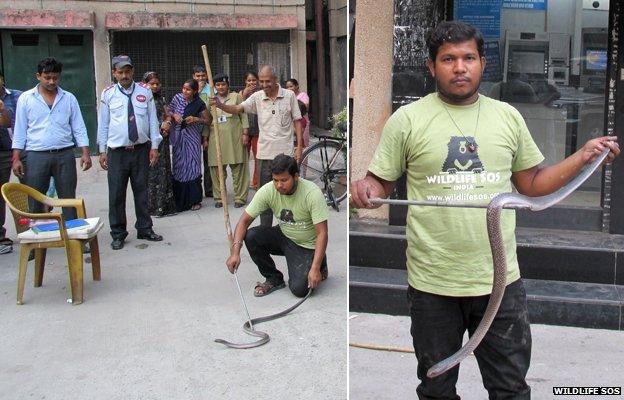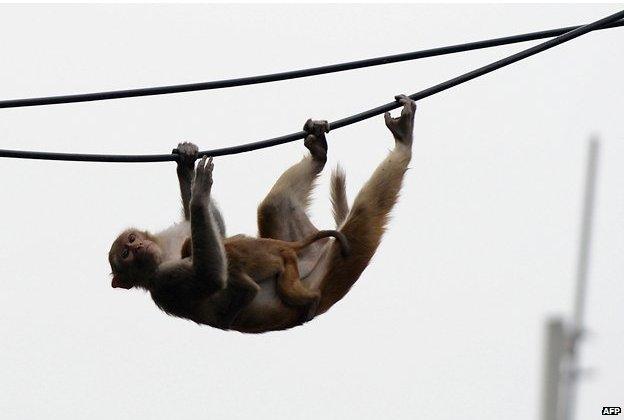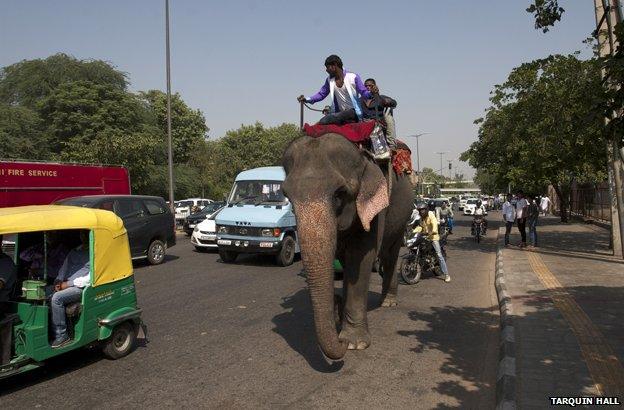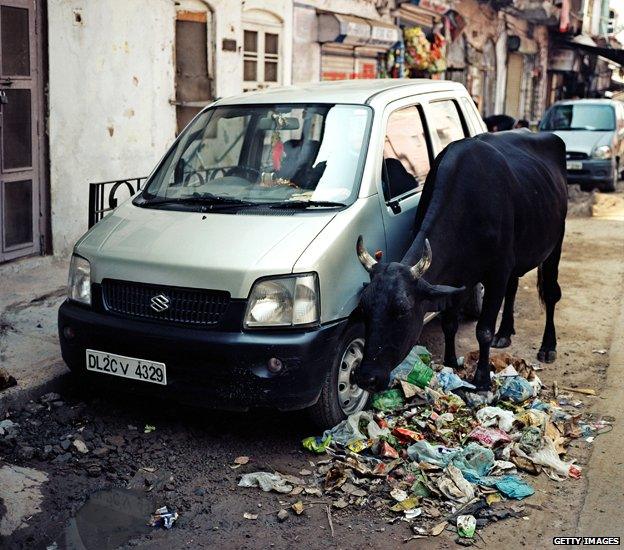The cash machine with a free cobra
- Published

Cows, cobras and monkeys are considered holy by Hindus and you'd be forgiven for thinking their divine status brings them better lives here on earth - in fact, the opposite seems to be true.
The other day, a passenger plane about to take off towards Delhi hit a water buffalo on the runway. The poor beast - black from head to hoof - simply couldn't be seen in the gloom of evening.
A week earlier, a wildlife charity was called in to capture a cobra lurking at a Delhi cash machine. Needless to say, he'd failed to charm unsuspecting customers.
And all summer, complaints of marauding rhesus monkeys raiding homes and offices have flooded civic hotlines.
Perhaps because of perceived mythological powers, these animals are often left to fend for themselves but in a country where growing populations are swallowing up habitat, India's wildlife needs all the help it can get.

Take elephants. They are without doubt, iconic symbols of all that is wild, majestic and colourful about India. But today, their plight also illustrates how antique religious and cultural notions are holding back their conservation.
Anyone who's lived in India knows what an amazing sight it is to suddenly spy a pachyderm roaming around your neighbourhood. Their sheer size is of course the first thing you notice. During religious festivals, decorated elephants are invited to Hindu temples, where devotees feed them kilos of chapattis and sweets. They are seen as representatives of Lord Ganesha, who has an elephant's head.
Partly fuelled by this fascination, elephants are captured and hired out at events. But their life in the city is far from heavenly.
Recently, two Delhi elephants were hit by lorries as they took advantage of lower temperatures to take a night-time walk - the trouble was, their keepers chose the city's busy ring road for their stroll. One was blinded and the other could barely stand as a result of the accident.
A local charity took the injured beasts to a sanctuary. But their veterinarian told me he sees many malnourished and suffering elephants in cities. The most common problem they face is that their feet are constantly assaulted by hot tarmac, broken glass and nails. The injuries form painful abscesses, he said, and those can lead to cancer.
Still, Delhi is home to eight working elephants. Six disappeared last year and are presumed dead. And while the city is no longer issuing new elephant licenses, it is also not providing protection or support to the remaining animals.
Delhi's chief wildlife warden admitted he had few resources. His only answer, he said, was to personally harangue owners to leave the city voluntarily, and to take their elephants with them. But that is not happening.

Down by the banks of the Yamuna river, I meet Heera. The 50-year-old elephant has been the star attraction at lavish Delhi weddings, birthday parties and religious festivals. Heera used to live permanently on the banks of the Yamuna, a polluted river where nonetheless fresh air, space and foraging are more readily available.
But a few years ago, the city banned elephants from living here, and Heera was moved to a crowded slum where the concrete lanes are barely wide enough for a pachyderm to pass. Now, he only visits the river.
While Heera is microchipped and occasionally a city inspector comes to check up on him, there is no veterinary support on offer.
Heera's owner, in the elephant business for generations, refuses to leave the city and believes the animal is an integral part of Delhi's heritage. He feels the devotion he and others show to Heera is all the beast needs - apart from kilos of juicy sugarcane.
But the veterinarian who rescued the two elephants hit by lorries says Indians need a reality check when it comes to endangered - if holy - animals. "If people believe in Lord Ganesha, they have the option of asking for a blessing. Why do they need a live animal? Elephants simply don't belong in a concrete jungle," he says.
Neither presumably do monkeys, cows, cobras, or even packs of street dogs - protected by law, but still suffering from mange and unspeakable infections and injuries.

Whether they are considered sacred or profane, whether Delhi is their natural habitat or not, all of these species desperately need human help.
India's new prime minister came to power on a promise of providing toilets before temples - perhaps, similarly, it's time to put animal welfare before worship.
How to listen to From Our Own Correspondent, external:
BBC Radio 4: Saturdays at 11:30
Listen online or download the podcast.
BBC World Service: Short editions Monday-Friday - see World Service programme schedule.
Subscribe to the BBC News Magazine's email newsletter to get articles sent to your inbox.